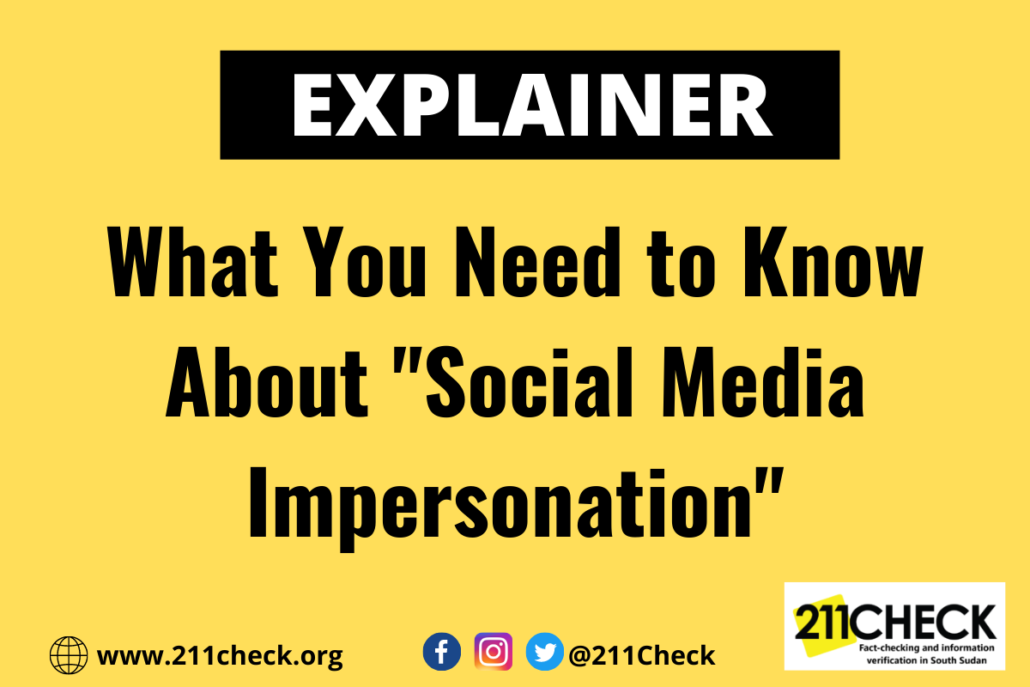EXPLAINER: All You Need to Know About “Social Media Impersonation”
As technology continues to become a part of our day-to-day life, social media impersonation attempts by malicious actors are also far from coming to a halt but rather becoming more sophisticated in nature.
By Vukeni Innocent Joseph
When we think about impersonation, the first thing that comes to mind is an act of deception. Impersonation schemes have become more common and deadly in South Sudan in recent months.
Impersonation scams are acts of manipulation carried out by cyber criminals or threat actors in order to achieve their goals, which may include cyber bullying, harassment, financial gain, or a need for personal or confidential information from the target, by duping them into believing the scammer is genuine or someone they know.
Due to a large online presence, which is further a result of the embracement of technology, the most common type of impersonation occurs on social media platforms such as Facebook, Instagram, WhatsApp, Twitter, and even through emails. As a result, impersonators have more freedom to carry out their actions.
Threat actors impersonate a trustworthy entity or individual on social media to entice their victims. This is accomplished by a technique known as social engineering, in which the fraudster poses as someone else in order to deceive the victim.
Impersonators come across as intelligent actors in their actions simply because they thoroughly investigate their targets on social media to gain vital information about them, such as hobbies, mutual friends, and favorite hangouts. Surprisingly, all of this information is readily available through the posts we make on our social media accounts in the form of images, status updates, and unfettered biographic information, which scammers exploit for nefarious purposes.
An impersonator searching for your Facebook profile and reading through it for information that would be of interest to them, which they can use to carry out impersonation, is a common example. The impostor could carry out their fraud in two ways utilizing the information they collect from your page: setting up as a new Facebook user with the victim’s identity and uploads (profile and cover photographs), and then using this phony page to entice your friends, coworkers, or family members. Alternatively, the impostor could create an account in your name and deceive you by imitating a friend, coworker, or family member.
As technology continues to become a part of our day-to-day life, social media impersonation attempts by malicious actors are also far from coming to a halt but rather becoming more sophisticated in nature.
However, we can mitigate this cyber crime or malicious act by following and adhering to some basic best practices while on the internet, and these include;
● Being cautious of the information we post on social media or limiting the information we avail on our accounts for example, our phone numbers, date of birth and address where we reside, as they may contain too many details which a scammer could use to their advantage.
● Do not use the same login credentials on two or more social media accounts. This would mean that if your login credentials get to be known, a cyber criminal could take your social media accounts hence denying you access. It is also good practise to use password managers to manage your login credentials for multiple accounts online.
● Do not click random suspicious links sent on social media and be keen to know the source of the link, as this could also be an entry point for malware such as spyware or viruses on your phones or computers
● Verify the genuineness of social media accounts that may want to engage with you, making sure that the source of any kind of communication or advert is known to you.
● Endeavor to report cases of impersonation to SafetyComm South Sudan which will aid in verification of false accounts and also have those accounts taken down from the internet.

 211 Check
211 Check 211 Check
211 Check 





Leave a Reply
Want to join the discussion?Feel free to contribute!